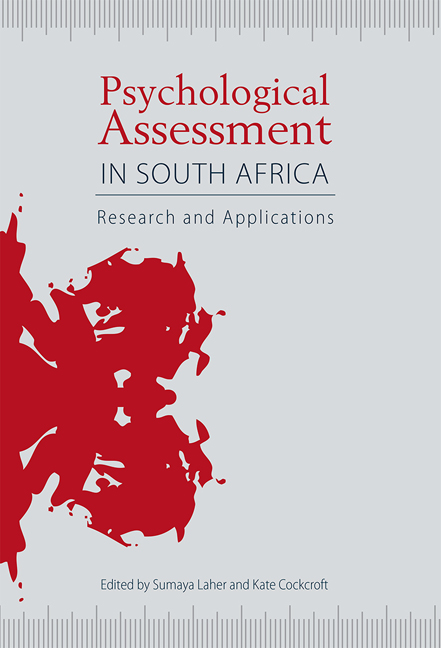Book contents
- Frontmatter
- Contents
- Tables and figures
- Acknowledgements
- Acronyms and abbreviations
- 1 Contextualising psychological assessment in South Africa
- Section One Cognitive tests: conceptual and practical applications
- 2 WAIS-III test performance in the South African context: extension of a prior cross-cultural normative database
- 3 WISC-IV test performance in the South African context: a collation of cross-cultural norms
- 4 The Senior South African Individual Scales – Revised: a review
- 5 Assessing school readiness using the Junior South African Individual Scales: a pathway to resilience
- 6 School readiness assessment in South Africa
- 7 The Kaufman Assessment Battery in South Africa
- 8 The Das-Naglieri Cognitive Assessment System
- 9 Dynamic assessment in South Africa
- 10 The Learning Potential Computerised Adaptive Test in South Africa
- 11 APIL and TRAM learning potential assessment instruments
- 12 The Griffiths Mental Development Scales: an overview and a consideration of their relevance for South Africa
- 13 Neuropsychological assessment in South Africa
- Section Two Personality and projective tests: conceptual and practical applications
- Section Three Assessment approaches and methodologies
- Contributors
- Index
11 - APIL and TRAM learning potential assessment instruments
from Section One - Cognitive tests: conceptual and practical applications
Published online by Cambridge University Press: 21 April 2018
- Frontmatter
- Contents
- Tables and figures
- Acknowledgements
- Acronyms and abbreviations
- 1 Contextualising psychological assessment in South Africa
- Section One Cognitive tests: conceptual and practical applications
- 2 WAIS-III test performance in the South African context: extension of a prior cross-cultural normative database
- 3 WISC-IV test performance in the South African context: a collation of cross-cultural norms
- 4 The Senior South African Individual Scales – Revised: a review
- 5 Assessing school readiness using the Junior South African Individual Scales: a pathway to resilience
- 6 School readiness assessment in South Africa
- 7 The Kaufman Assessment Battery in South Africa
- 8 The Das-Naglieri Cognitive Assessment System
- 9 Dynamic assessment in South Africa
- 10 The Learning Potential Computerised Adaptive Test in South Africa
- 11 APIL and TRAM learning potential assessment instruments
- 12 The Griffiths Mental Development Scales: an overview and a consideration of their relevance for South Africa
- 13 Neuropsychological assessment in South Africa
- Section Two Personality and projective tests: conceptual and practical applications
- Section Three Assessment approaches and methodologies
- Contributors
- Index
Summary
APIL ((Conceptual) Ability, Processing of Information, and Learning), TRAM-2 and TRAM-1 (Transfer, Automatisation and Memory) are a suite of learning potential batteries designed for use over a wide educational spectrum, ranging from no education to tertiary level. All three produce multiple component scores as well as a global or overall learning potential score. All are based on a theoretical position broader than the one normally underpinning learning potential instruments.
This chapter presents an overview of these instruments. First, the theory on which they are based is presented. This is followed by a description of the structure of the batteries. Finally, information on the subscale intercorrelations, reliability, validity and bias of the three instruments is presented.
The theoretical basis of the instruments
The concept of learning potential originated with Vygotsky (1978; original Russian publication 1926). According to Vygotsky, intelligence has little or no genetic base and is, rather, a set of competencies passed on to others by parents, caregivers, educators and peers. Thus, it is primarily a social phenomenon and only secondarily a personal characteristic.
Vygotsky did, nevertheless, accept that there were differences in learning potential between individuals. This he operationalised in the concept ‘zone of proximal development’ (ZPD), which is the extent to which an individual can improve performance in an intellectual task given mediation by a skilled other. Learning potential is a difference between performance after mediation and performance before. Vygotsky does not explain how a person might ultimately excel beyond the level of his or her teachers and mentors (as did Mozart). In this regard, the difficulty of his conceptualisation of learning potential lies primarily in the almost exclusively social nature of his theory, which leaves little place for internal factors such as genetic endowment. Even individual differences in the magnitude of the ZPD seem difficult to explain in the absence of these factors.
The Israeli psychologist Feuerstein further developed Vygotsky's work, creating tools to assess and develop learning ability, the Learning Potential Assessment Device for the former and the Instrumental Enrichment programme for the latter (Feuerstein, Rand & Hoffman, 1979; see also Grigorenko & Sternberg, 1998). Several other researchers have also developed learning potential assessment tools, but for the most part they remain close to the Vygotskyian idea of assessing learning potential through a difference score, assessed in a ‘test-teach-test’ procedure.
- Type
- Chapter
- Information
- Psychological Assessment in South AfricaResearch and Applications, pp. 158 - 168Publisher: Wits University PressPrint publication year: 2013



